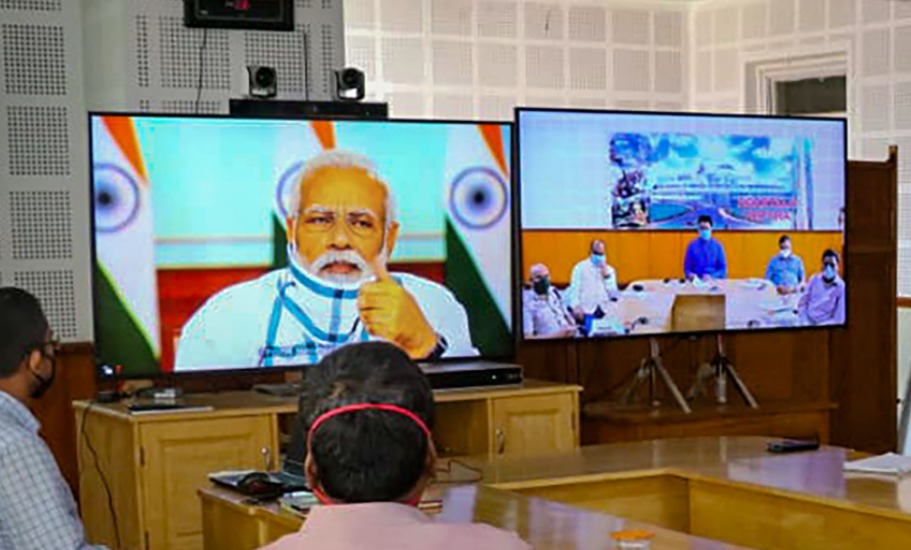
Restrictions to stay even after May 3, states want flexible approach
The nationwide lockdown implemented to contain the spread of COVID-19 is unlikely to be lifted in one go on May 4 as many state governments are in favour of extending the restrictions, especially in areas where the infection is yet to brought under control.

The nationwide lockdown implemented to contain the spread of COVID-19 is unlikely to be lifted in one go on May 4 as many state governments are in favour of extending the restrictions, especially in areas where the infection is yet to brought under control.
The consensus that emerged in Monday (April 27)’s video conference between Prime Minister Narendra Modi and chief ministers of different states and union territories, is that restrictions should remain for the time being in areas where the spread of coronavirus continues to be rapid.
During the conference, the state governments said the situation will become more troublesome if free movement is allowed in areas that they described as hotspots, containment zones or red zones. They suggested states should be free to keep a tight lid on these zones while relaxing the restrictions in other areas.
Related news: Lockdown: Meghalaya govt lifts restrictions on number of activities
Based on the suggestions provided by chief ministers, the central government is likely to chalk out an “exit plan” to lift restrictions in phases while ensuring states have the liberty to clamp down on troubled spots with severe restrictions.
Many state governments are of the view that restrictions should remain till mid-May to ensure the COVID-19 situation does not go out of control and the curve is flattened across the country. Inter-state transportation is likely to remain shut till then, and this could mean no railway or passenger flight services as well. On the other hand, rural restrictions are to be relaxed further to ensure farming activities are not hindered.
Fight is not over yet
Most states were of the view that the fight against the spread of coronavirus is far from over and a lot more needs to be done before schools and colleges are allowed to reopen. That will take another three months, according to officials who are aware of the discussions at the video conference.
The Centre is also of the view that there is no scope for complacency and the war against COVID-19 should be carried on with full caution till fresh cases reduce to a trickle and casualties are eliminated altogether. The officials said chief ministers of a dozen states and UTs spoke during the conference with the prime minister.
Livelihood concerns dominating
While the initial alarm over the pandemic has ebbed a bit due to the month-long lockdown, concerns over livelihood, employment and essential commodities are increasing. At the video conference, the Centre emphasised issues pertaining to migrant labourers should be handled with care and a calibrated plan should be in place when normalcy is restored.
PM Modi has consulted with the chief ministers through video conferences on three earlier occasions to discuss the impact of COVID-19 and today’s was the fourth such meeting between the government heads. Home Minister Amit Shah and Health Minister Harsh Vardhan also participated in today’s consultations.
Demand for financial assistance
Many states also reiterated their demand for more financial assistance from the Centre as their resources have been stretched to the maximum. They demanded special funds for rehabilitation of those whose livelihoods have been affected and relief for the migrant labourers as well.
Huge employment losses and pay cuts will result in a need for huge doses of relief, the states stressed during the conference. Some also called for attention on the issue of Indians working abroad, who are returning to the country in large numbers due to loss of employment.
Normalcy soon in smaller states
Normalcy in likely to be restored soon in smaller states like Goa, Sikkim and some in the Northeast as no new COVID-19 cases have been reported from there. The situation, however, is just opposite in Maharashtra, Delhi, Tamil Nadu, Madhya Pradesh, Rajasthan and some other states that are struggling with rising numbers of new infections, casualties and hotspots, said officials.
The Centre, after a feedback from the states, is likely to prepare a detailed plan for phased return of normalcy across the country, and the home ministry will convey this to all states and UTs with sufficient flexibility, the officials added.
Related news: Impose COVID cess on ultra-rich to offset revenue loss: Kumaraswamy

